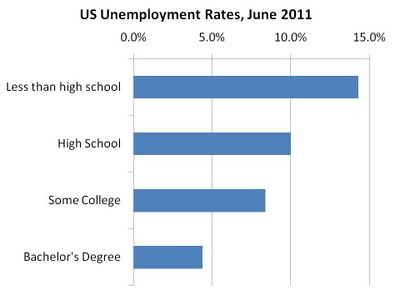In the latest jobs report out of the US, it was estimated that only 18,000 net jobs were created in the month of June, which is rather insignificant in comparison to the fourteen million people classified as unemployed. However, what these headline numbers fail to expose is that a number of US corporations wish to hire, but cannot find workers with the sufficient skills.
To see this, consider the current unemployment rate for the following groups, separated by their educational attainment levels:
Note that the overall unemployment rate in 2007, when the American economy was booming, was 4.6%, which is higher than the current unemployment rate of 4.4% for those with Bachelor’s degrees. This data suggests (although it does not prove) that there is a shortage of educated workers in the US.
I say the data does not prove a shortage of educated workers because some may argue that the educated workers are just better equipped to take the limited jobs that are out there, and so there is no shortage of workers at all. That conclusion is not borne out by the data, however.
If the educated were simply taking jobs away from the uneducated, one would not expect to see the gap between the salaries of the educated and the uneducated continue to grow – but it has. Moreover, the average salary offered to current university graduates is around $48,000/year, which is well above median salary of the average worker with many years of experience.
Now consider the situation from the perspective of America’s most innovative companies. Hundreds of companies generated returns on investment of more than 15% in the last year, including the following:
- 3M
- Accenture
- Altera
- Apple
- Dell
- Intuit
- Johnson & Johnson
- Microsoft
- Netflix
These companies are able to make products/services that the world desires, even through recessions. Because they are at the cutting-edge of their fields, they are able to provide value to their customers while at the same time generating hefty profit margins and investment returns. To continue to innovate and drive these returns, these and the plethora of other companies looking to grow to this size need educated workers, and they are willing to pay for them, as evidenced by their higher salaries and lower unemployment rates.
To improve America’s prosperity, the emphasis should be on increasing its number of educated workers, as there is a shortage. On the other hand, there is an oversupply of uneducated workers, not only in America but around the world. As a result, developing countries will continue to steal market share in the production of goods with low value-added. America’s advantage is in its ability to innovate and contribute to the creation of the world’s highest-priced goods, however, from PC chips to OS software to smartphone designs to web software to jet technology to medical/pharmaceutical research. To continue to supply the world with the most advanced products in the world, America’s companies are starved for workers with the ability to contribute. Policies that increase the number of educated workers are what the country needs, as they would help shield the country from economic hardship.




